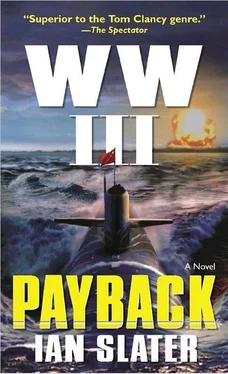“Doesn’t look like steel,” opined Cuso.
“Correct,” answered the general. “State of the art, Commander. A Stealth craft if ever I’ve seen one. Low silhouette, some steel but mainly epoxy carbon composites all over. Effectively nonmagnetic and sonar-absorbing. Even its flip-out stabilizer fins midships, forward diving planes, and its bow-cum-stern stabilizer fins are composite material. Anyway, damn thing’s so small, we’ll be lost in the sea clutter to any shore radar.”
The tall African-American was impressed. Even so, Commander Cuso, whose home was a 95,000-ton, technologically sophisticated Nimitz-class carrier, had his doubts. “It looks—,” he began, then paused. He saw no point in injecting any negativity during the highly classified “eyes only” launch.
But Freeman completed the commander’s sentence. “Looks unstable, right?”
“Well, yes,” answered Cuso. “Seems as if it’d roll in an early-morning dew.”
Freeman’s response was a jocular grunt in the darkness, only the midship section of the long gray craft clearly visible, caught in the hydraulic arm’s spotlight, which now abruptly shifted, sliding off the RS like a circular white sheet that was now undulating up and down the swells that had pushed the craft momentarily under the carrier’s launch platform as the McCain rose slightly in a big surge.
There was a thump, six inches of cable arm having suddenly unraveled from the hydraulic arm, the sixty-five-foot-long craft, despite side lines, swinging precariously, its tear-shaped bow barely missing the folded starboard wing of an S-3B Viking refueler and antisub aircraft. “Careful!” Freeman bellowed.
“Son of a bitch!” yelled Aussie, previously preoccupied with going over his combat pack. “That’s all we need. Crush the fucker before we even start.” But it was too late; the RS’s stern, momentarily in free swing, struck one of the launch party. There was no other sound than a sickening thud on the steel deck as Chief Petty Officer Tavos collapsed and was quickly “stretchered” away to the ship’s hospital for first aid or more if necessary.
“Murphy’s everywhere,” cursed Sal, simultaneously reminding Aussie that none of the three exit/entrance collars on the RS was made wide enough for a man with his control pack on to pass through.
“Won’t be a problem, Brainless,” joshed Aussie, while saying a quick, silent prayer that Tavos wasn’t seriously injured. “You pass the pack down to one of our drivers. Right?”
“Drivers?” said Eddie Mervyn, feigning resentment. “Cheeky bloody Aussie. We are ALWAC pilots !”
“Bullshit!” said Aussie, sucking his Camelback’s tube, then spitting the first mouthful out as he released the hold-back string on the water tube’s clamp. “You’re wankers. Friggin’ idiot could drive this whore. Computerized to the max. GPS, SatNav ’tronics.” Aussie glanced over at one of the carrier’s Marine contingent, whose job it was to guard such “eyes only” launches and, in general, assist in maintaining good order and discipline on the boat. “Reckon,” continued Aussie, “that one of these Leathernecks could drive it.”
The Marine grinned, trying to adopt the pre-launch levity that all of the SpecFor team, except General Freeman, were using to quell the inner anxieties that always accompanied such clandestine “direct action” missions behind enemy lines. And one man already down. How serious was his injury? Would he be good to go? Freeman’s uncharacteristic shift in mood, however, was not caused solely by the RS bashing into Tavos or by any second thoughts by the general about his selection of the reversible-submersible for the mission. Indeed, he was confident that, the accident with Tavos notwithstanding, the RS would safely and swiftly transport his team, either on the surface or submerged, to the enemy shore. What had triggered the worry lines not visible to the others in the darkness but which he felt creasing his forehead was the smell memory triggered by the fleeting yet distinct odor of sizzling onions from one of the carrier’s dozens of “short order” kitchens, where the ubiquitous hamburger ruled. It was the succulent aroma of the sweet onions — not the stronger, cheaper variety, but the much milder eastern Washington Walla Walla variety his mother used to insist on and fry for his dad, who, like many other onion lovers, would at times, as he’d told Margaret, eat the Walla Wallas raw, so gentle was the taste on the palate.
It had been the reason Freeman’s dad had earned the nickname “Costanza,” after the Seinfeld character who, having lost his spectacles, took what he thought was an apple from the fridge and began to eat it, his pride refusing to admit the mistake, so that soon his eyes were streaming with tears. But rather than the smell memory, triggered by the mouthwatering aromas of the carrier’s short-order chefs, reminding Freeman of the hilarious Seinfeld scene and its association with his beloved dad munching away contentedly on the seasonal Walla Wallas, it disturbed him, just as it had when — God only knew why — the general had found himself thinking of onions while watching the horrific videos of the man-portable missiles attacking the three airlines.
Or was it that the whiff of the frying sweet Walla Walla onions now on the carrier was merely a reminder of the MANPAD attacks, of how one experiences the most absurd random and often inappropriate thoughts at times when you would expect yourself to be focusing solely on the tragedy or the dangerous job at hand?
Perhaps, Freeman mused, such random thoughts were simply the mind’s way of escaping from a deluge of sensory input, in this case drawing him away from the horror of the MANPAD murders, away from, however temporarily, the strain of the external event on the mind in the way that one’s crazy, uninhibited night dreams vent the tensions of our necessarily inhibited, civilized days. Or, dammit, was the smell memory trying to tell him something quite rational, even banal, yet important? Onions, his dad, and MANPADs . What in hell was the connection? He felt as if he were working a crossword: parents, onions, MANPADs, and—
“General?” It was Aussie.
“Yes?”
“Bad news, I’m afraid. Tavos got clobbered worse’n we thought. Doc’s just sent down word that our boy’s got one hell of a gash at the base of the neck, hemorrhaging like a bastard. He’s out. We can’t take him. I’d say you’re it, General. You can use Tavos’s pack. Blue Tile can keep their satellite eye on us.” He paused, waiting for Freeman’s response. But Aussie knew what the answer had to be. No matter that the President had preferred the general to stay back in McCain ’s Blue Tile rooms, the hard fact was that one man less than planned on a mission such as this was like a coach taking out his first baseman.
“You good to go, General?” asked Aussie.
“I’m ready,” said the general, bracing himself against the bulkhead, palming the ten-round mag into his “blued” 9mm HK sidearm, grabbing his personal combat pouch and lowering it to Sal, who was already up in the RS’s midship hatch, holding Tavos’s full pack. “How’s Choir doing?” he asked.
“Green,” said Sal.
“He’ll be right as rain,” said Aussie. “It’s all this slopping about on the surface that bothers him. Once we’re submerged, out of the chop, he’ll be okay.”
For Choir’s sake, Freeman was tempted to order Eddie Mervyn and Gomez to head straight for Kosong, due west, to reduce the time they’d be planing through the chop, but he stuck to his planned route, a tight-angled dogleg approach, northwest then southwest, which he was confident would be the least-expected line of attack.
Читать дальше












